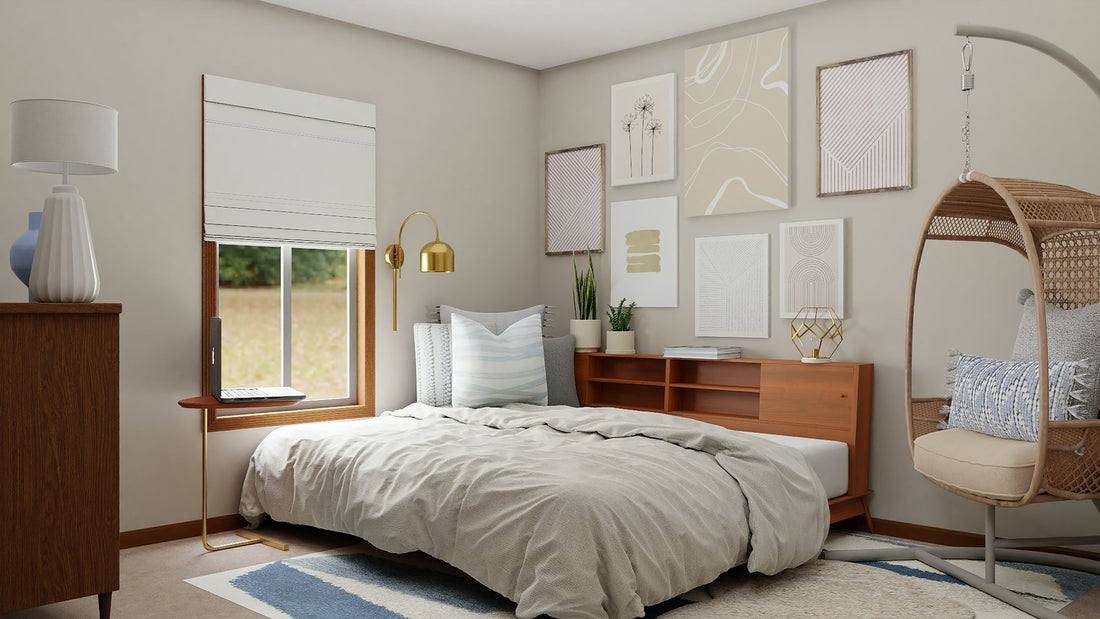In this blog post, we will explore a few simple and effective ways to reduce toxins in your bedroom, so you can enjoy a healthier and more peaceful sleeping environment.
1. Use low or zero VOC paint.
Volatile organic compounds (VOCs) are chemicals that can evaporate into the air and cause indoor air pollution. Many types of paint, including conventional latex and oil-based paints, contain VOCs. For a healthier sleeping environment, choose low or zero VOC paints.
2. Get a non-toxic mattress or toppers:
Choose a mattress made of natural materials like latex, lamb fleece, cotton or wool, instead of synthetic materials like polyurethane foam. Polyurethane foam often emit volatile organic compounds (VOCs) that have been linked to a variety of health problems*, including headaches, dizziness, and respiratory issues.
3. Choose natural materials for bedding, pillows, duvet and sleepwear.
Good quality bed sheets and sleepwear are essentials for a good night sleep. Although very popular, polyester bed sheets often contain harmful substances such as formaldehyde, flame retardants, and heavy metals. Instead, try natural fibers natural organic fibers like organic cotton, bamboo, linen, and hemp that are breathable and more comfortable, and also free from harmful chemicals.
Likewise for pillows, duvet and blankets, avoid synthetic materials** and choose natural fibers such as kapok, wool, cotton, latex or buckwheat to reduce toxins in your bedroom and improve the quality of your sleep.
4. Avoid using synthetic air fresheners and candles.
They might smell good and feel romantic but synthetic air fresheners and candles contain a variety of harmful chemicals, including phthalates, which are linked to endocrine disruption and other health problems. It is easy to choose natural alternatives. Choose beeswax candles for example or get a diffuser and experiment with essential oils such as lavender, eucalyptus, or sweet orange. These oils provide a calming and relaxing effect, helping you get a good night's sleep.
5. Use natural cleaning products.
Conventional cleaning products give off a variety of harmful chemicals into the air. To reduce exposure to these toxins, switch to natural cleaning products like vinegar, baking soda, and lemon juice. These natural cleaning products are not only more environmentally friendly but also safer for your health.
6. Invest in a high-quality air purifier.
A high-quality air purifier can help remove harmful pollutants and allergens from the air in your bedroom. This can be especially important if you live in a polluted area or have allergies or asthma. Choose an air purifier with a HEPA filter, which can remove up to 99.97% of particles as small as 0.3 microns.
7. Open your windows and let in fresh air.
Getting fresh air into your bedroom will improve its air quality. Make sure to open your windows regularly, especially after cleaning or using harsh chemicals, to let in fresh air and reduce exposure to indoor air pollutants.
8. Avoid using electronic devices before bed.
Electronic devices, like smartphones, laptops, and televisions, emit blue light, which can interfere with your circadian rhythm and disrupt your sleep. To reduce exposure to blue light, switch your smartphone or tablet for a book instead, or listen to music before going to bed.
In conclusion, reducing toxins in our bedroom is an important step in creating a healthier and more peaceful sleeping environment. By following these simple steps, you will enjoy a healthier and more comfortable bedroom, free from harmful chemicals and toxins. A step at a time, you can easily create for yourself a very healthy sleeping environment and start feeling the difference on your well-being.

